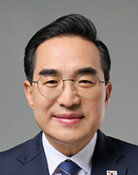Results of the inter-Korean ministerial talks
Results of the inter-Korean ministerial talks
Posted September. 29, 2000 20:16,
The recently ended third round of inter-Korean ministerial talks served as an opportunity to conduct a comprehensive review of the developments in inter-Korean relations and related problems. The two Koreas have produced many results, such as the staging of bilateral defense ministers' talks, but there are some issues that remain unattended, largely due to their tight schedules. At the ministerial meeting, the two sides reaffirmed that the ministers talks should play a central role in the implementation of the pending tasks and pledged to address unresolved issues and map out the future course of the implementation of inter-Korean exchanges. In this context, the two sides agreed to supplement the family reunion project, for which the latest Red Cross talks failed to produce tangible results.
At the recent ministerial talks, South and North Korea affirmed two-tiered bilateral cooperation through the regularization of the defense talks and economic implementation commission meetings under the supervision of the ministerial talks, so as to simultaneously promote tension reduction and economic exchanges. The outstanding achievement of the ministerial talks was that the two sides came close to an agreement on the establishment of three subcommittees on military, economic cooperation and social-cultural exchanges.
The agreed upon inter-Korean soccer matches are expected to be held regularly alternately in Seoul and Pyongyang starting on Aug.15 National Liberation Day next year. The Seoul-Pyongyang soccer games were held from 1929 to 1946 but were discontinued thereafter.
The Koreas staged "unification soccer matches" in Seoul and Pyongyang in 1990. The games are expected to become a catalyst to spur various other inter-Korean exchanges not only in sports but also the social and cultural sectors.
Another notable outcome of the talks were the mutual agreements on the confirmation of the whereabouts of family members divided between the two Koreas, exchanges of correspondence and the setup and operation of a permanent family reunion venue.
Noting that the second round of Red Cross talks failed to address the family reunion program, related government authorities decided to give positive support to the Red Cross society for the settlement of the pending tasks at the third round of talks slated for December, Kim Hyung-Ki, policy bureau director of the Unification Ministry, said. But it was pointed out that prospects for this are not bright, as the North expressed difficulty in confirming the whereabouts of displaced family members due to its lack of manpower and outdated computer systems.






![[단독]“거부도 못해” 요양병원 ‘콧줄 환자’ 8만명](https://dimg.donga.com/c/138/175/90/1/wps/NEWS/IMAGE/2026/03/02/133450041.2.jpg)
